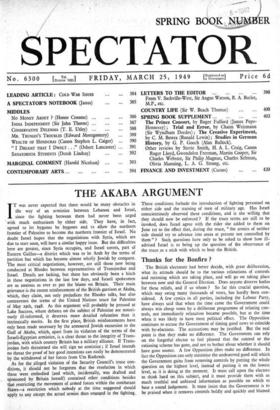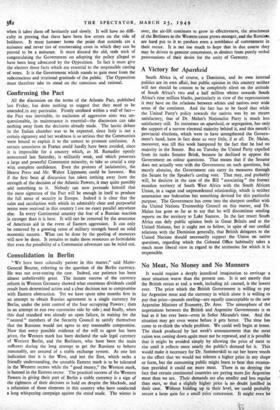Thanks for the Bonfire ?
The British electorate had better decide, with great deliberation, what its attitude should be to the various relaxations of controls and rationing which are taking place, and will go on taking place between now and the General Election. Does anyone deserve kudos for these reliefs, and if so whom ? So far this crucial question, which may swing many thousands of votes, has hardly been con- sidered. A few cynics in all parties, including the Labour Party, have always said that when the time came the Government could always win cheap votes by a deliberate programme of relaxing con- trols, not immediately relaxation became possible, but at the time when it was likely to have most political effect. The Opposition continues to accuse the Government of timing good news to coincide with by-elections. The accusations may be justified. But the real point is that they make no difference. The Government can rely on the forgetful elector to feel pleased that the control or the rationing scheme has gone, and not to bother about whether it should have gone sooner. A few Opposition jibes make no difference. In fact the Opposition can only minimise the undeserved good will which the Government gains from removing controls by putting the whole question on the highest level, instead of putting it on the lowest level, as it is doing at the moment. It must call upon the electors to think hard on this subject, and it must provide them with as much truthful and unbiased information as possible on which to base a sound judgement. It must insist that the Government is to be praised when it removes controls boldly and quickly and blamed when it takes them off hesitantly and slowly. It will have no diffi- culty in proving that there have been few errors on the side of boldness. It must hammer home the point that controls are a nuisance and never tire of enumerating cases in which they can be proved to be a nuisance. It must discard the old, stale trick of congratulating the Government on adopting the policy alleged to have been long advocated by the Opposition. In fact it must give the electors those facts which are essential to the responsible casting of votes. It is the Government which stands to gain most from the subconscious and irrational gratitude of the public. The Opposition must therefore take its stand on the conscious and rational.















































 Previous page
Previous page